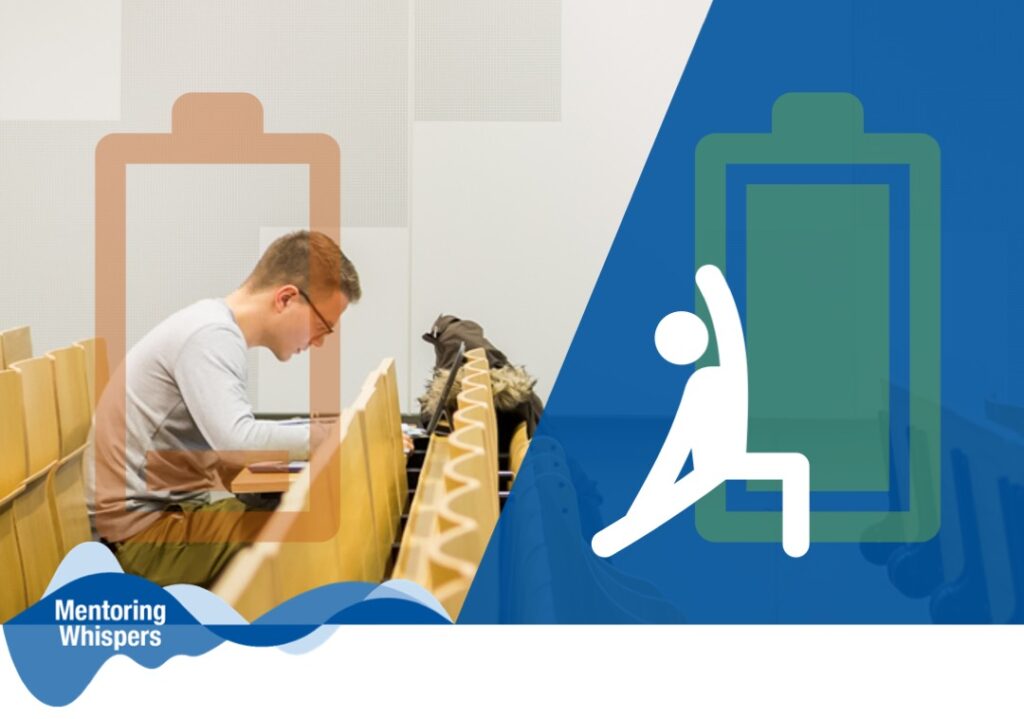Kategorie: ‘Mentoring Whispers’
Setting up the workplace sensibly – to increase concentration
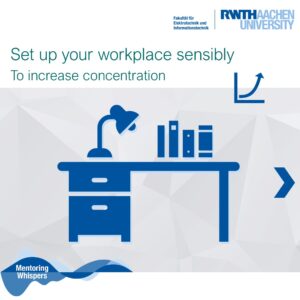 Especially in times of online teaching, it is important to have a decent workspace at home.
Especially in times of online teaching, it is important to have a decent workspace at home.
For this, you need a desk that has sufficient incidence of light, preferably daylight through a window. If this is not or not sufficiently given, it is useful to install additional desk lighting.
The desk and its chair should be ergonomic and adapted to the user’s height. Working at the kitchen table, on the couch or in bed is not beneficial to concentration and is also physically stressful in the long term.
There should be order on the desk. Even if a genius masters chaos, it is still very distracting if you can hardly find your notepad because of all the stuff on the table and have to search every time to find your pencil, calculator or ruler.
The necessary material should be ready, so that you can find everything quickly and without searching. For this purpose, it is best to have everything you need ready at the start of the day. In addition to working materials, this can also include something to drink and a snack.
The workplace should also be in an undisturbed place. If you are constantly disturbed and interrupted, concentrated work is not possible. If you have problems with this, you can also read the article on the topic of interruptions to find a remedy.
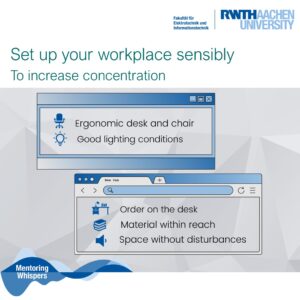
Semester reflection at the end of the examination phase
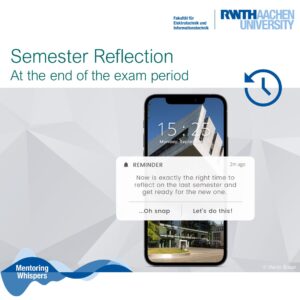 At the end of the exam period, all you really want to do is switch off, forget everything and rest until the new semester starts. Thinking about the past semester is not something you want to do right now.
At the end of the exam period, all you really want to do is switch off, forget everything and rest until the new semester starts. Thinking about the past semester is not something you want to do right now.
But now is exactly the right time to think about how things went.
What went well? You successfully stayed on the ball in all subjects during the semester, always knew what was going on and what was covered in the lecture, were able to keep up with all the exercises and passed the exam with flying colors? That’s great!
But most of the time this is more of a pipe dream and the reality is a bit different. Somehow you couldn’t keep up during the semester, the exercises were super difficult and before the exam you didn’t have enough time. And then the exam is not passed or the grade is not as good as hoped. Now think about what you want to do differently in the next semester and how you can go into the next exam phase better prepared.
You don’t really know why things aren’t going as planned? Contact the mentoring team and together we can see what we can improve and what you can adapt to get through your studies better. You can find more information at www.elektrotechnik.rwth-aachen.de/mentoring
Distracted? Interruptions, Noise and Things that Attract Attention
Interruptions are poison for concentration. After each distraction, the brain needs about 23 minutes to concentrate on the original task again. If someone is constantly banging into the room, all hell is breaking loose on the street outside the window and the phone is constantly ringing, it is difficult to work with concentration.
Interruptions can be caused by other people. Here it helps to go to a quiet place, lock the room and make it clear to everyone that no one can come into the room now. Phone calls can be deactivated using the cell phone’s flight mode.
If it’s always too loud, either earplugs or, if the silence makes you restless as a result, meaningless soundscapes that you can listen to with headphones will help. You can find many examples online.
Sometimes, however, you interrupt yourself with household activities that you “absolutely” have to do. Here it helps to go to a room where there are no such distractions.
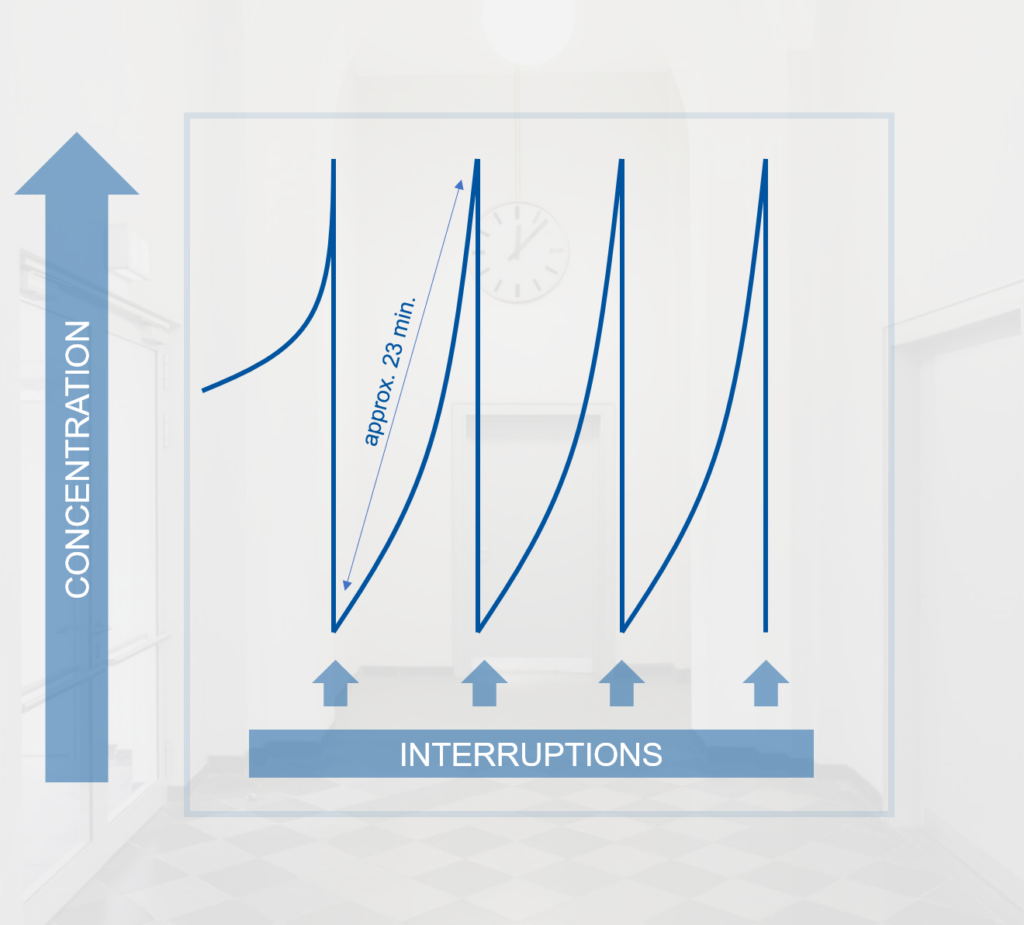
Distracted? – Lack of concentration
Somehow things are not going well, you can’t concentrate, are tired, and feel that you can’t do anything at all? An analysis of the day can help here. At different times we are differently efficient. Pay attention to performance highs and lows in your learning and daily planning. The morning is good for concentrated work, at noon there is a small low, which usually falls on the waking half of the day, and in the afternoon there is another small high before the concentration drops in the evening. Try adjusting your daily schedule to match your performance highs and lows so you can benefit from the good phases in the best possible way.
Written by Iris Heisterklaus
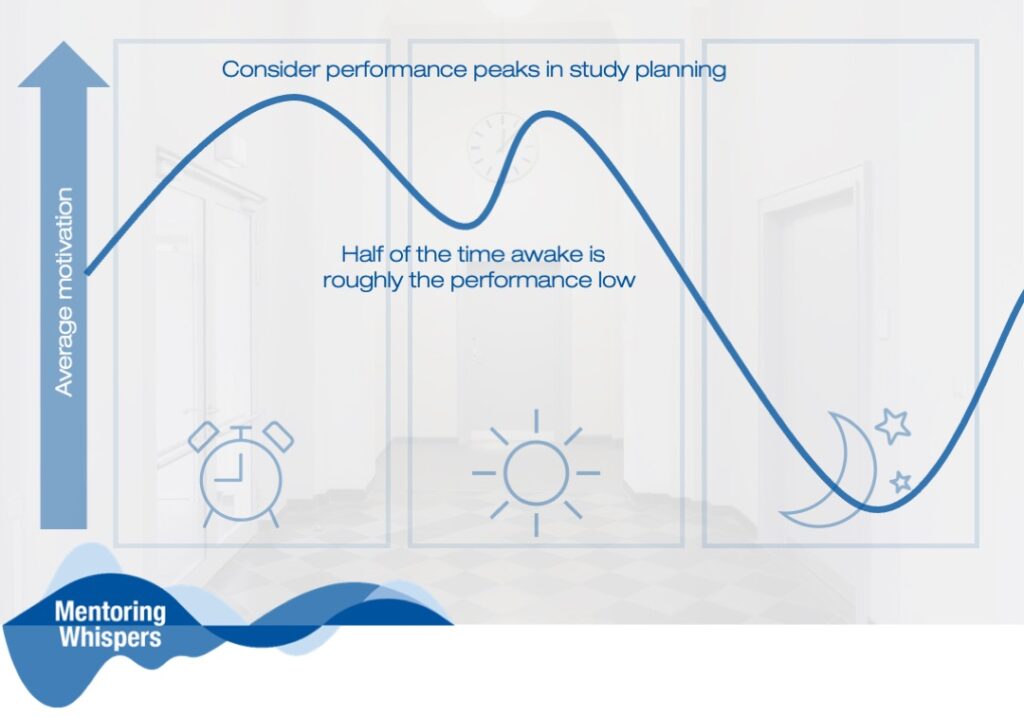
Distracted? – Fatigue and Overload
Are you feeling too tired and exhausted to study?
Fatigue usually comes from not sleeping enough. Have you ever tracked how many hours you actually sleep? Is this sleep also restful? When you’re tired, you can’t concentrate and you’re studying isn’t going anywhere.
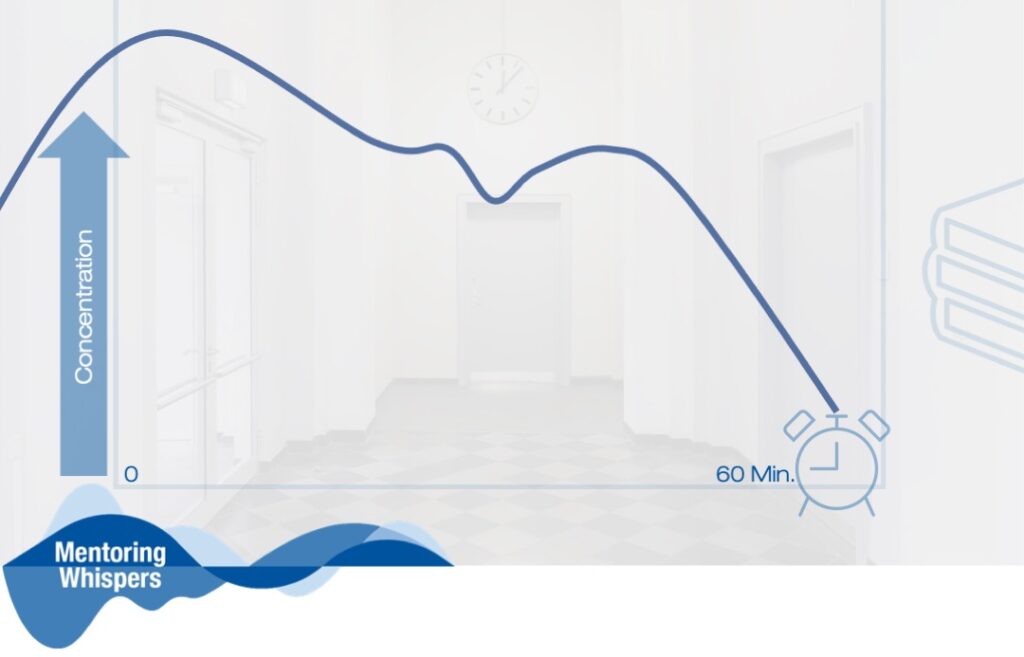 You only get tired while studying? This may be due to a lack of breaks. Pay attention to the concentration curve! After 30-45 minutes we need a short (!) break of maximum 5 minutes to restore our ability to concentrate.
You only get tired while studying? This may be due to a lack of breaks. Pay attention to the concentration curve! After 30-45 minutes we need a short (!) break of maximum 5 minutes to restore our ability to concentrate.
Ability to concentrate
Our ability to concentrate decreases with time. After 30-45 minutes a short break of max. 5 minutes should be taken. This restores the ability to concentrate. After 4 blocks of work, a longer break should be scheduled.
Pomodoro technique
One possible method of implementation is the Pomodoro technique. There are numerous apps designed to implement this technique.
You do sleep enough and take breaks during the day? Maybe have your blood values checked by your doctor, sometimes a mineral deficiency can make you feel tired.
Maybe you are overwhelmed. Do you have many other commitments besides university? You might be able to delegate some of them to someone else or give up some of them in order to relieve your workload. Restful sleep is also important in order to be able to sit behind your desk with renewed energy. The following measures can help you get a good night’s sleep:
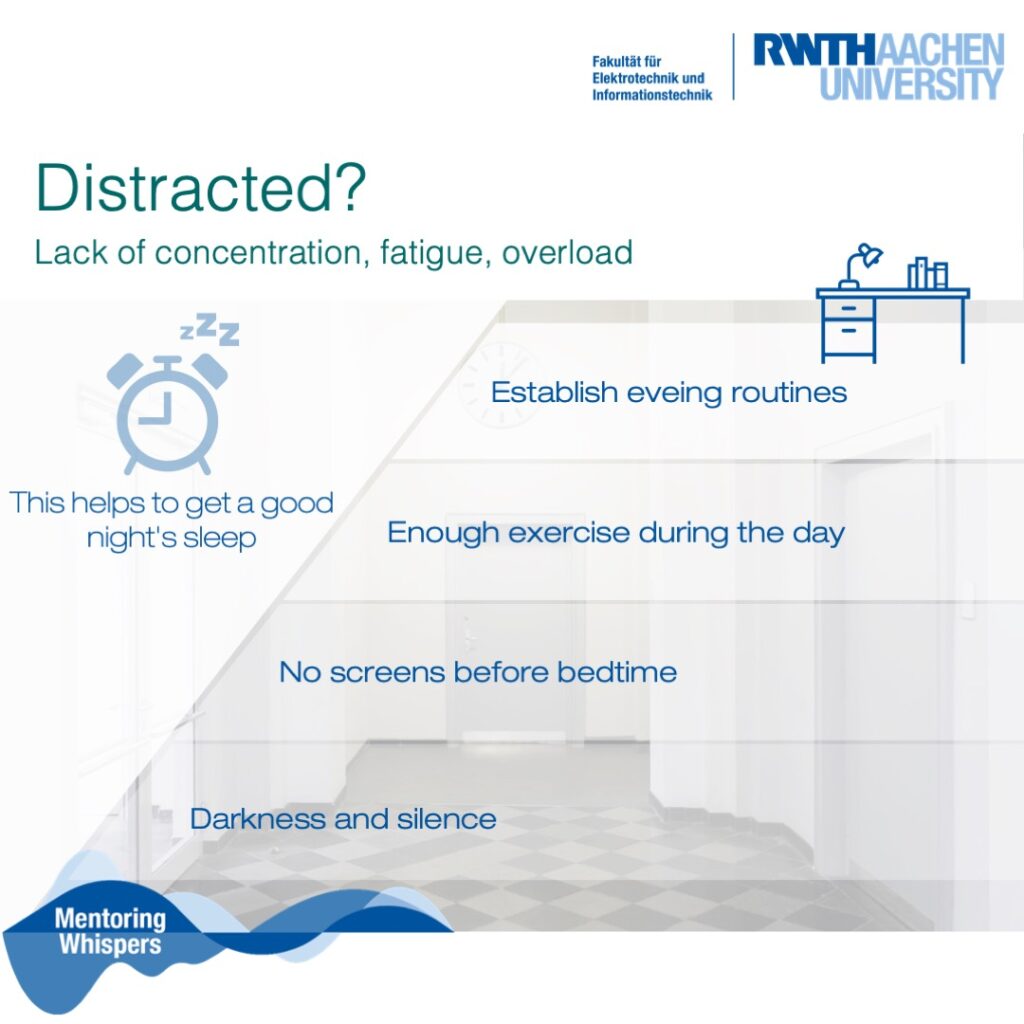
Written by Iris Heisterklaus
Methods of relaxation
You really need to relax – but don’t know how exactly? There truly are countless possibilities! To save you a lengthy search, our colleagues from the Central Student Advisory Service have compiled a number of relaxation methods and made them available to you in the form of video and audio instructions.
Have a look / listen! Just give it a try.
Find the videos on the website of the Central Student Advisory
Written by Christine Sander
Methods of activation
You’ve run out of steam while studying?
You’ve run out of steam while studying and are just hanging around?
Activation exercises can have a positive influence on your mood, increase attention and concentration, help you to take active breaks after sitting and working for a long time, and most importantly increase your energy level. The psychological counseling service of the student advice center has provided a few interesting exercises that, according to scientific studies, have a positive impact on concentration, attention, and well-being.
Whether it’s office jogging, finger qigong, or tapping: give it a try!
Find activation exercises on the website of the Central Student Advice Center
Written by Iris Heisterklaus
Beat the Corona Winter Blues – The cinematic medicine cabinet
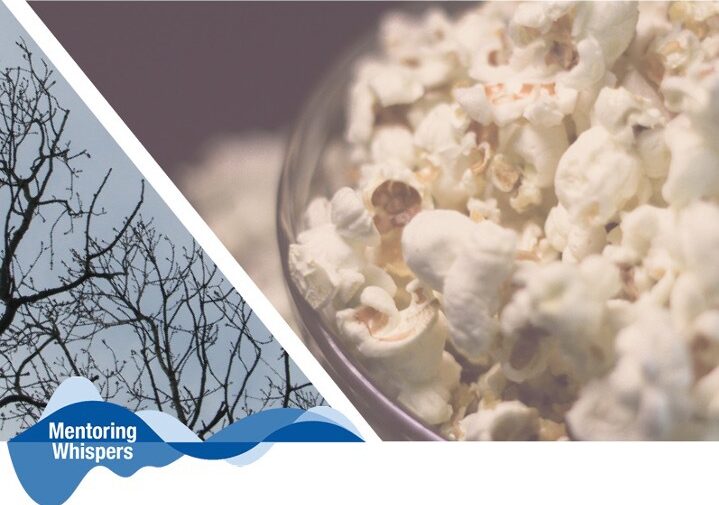 Movies can also be a good remedy. They make you laugh, they can relax you, some give you courage. They are a great contrast to your learning program.
Movies can also be a good remedy. They make you laugh, they can relax you, some give you courage. They are a great contrast to your learning program.
So put your feet up, take out the popcorn, and enjoy a movie!
When your smile muscles need a workout
– Zootopia
– 25 km/h
– Welcome to the Sticks (Bienvenue chez les Ch’tis)
True stories of perseverance
– Hidden Figures
– Lion
Movies of great little heroines and heroes and friendship
– Belle and Sebastian (2013, N. Vanier)
– Moonrise Kingdom
– Isle of Dogs
Movies about passion for music that are guaranteed to get you off the couch
– Bohemian Rhapsody
– The Commitments
Simply wonderfully strangely beautiful
– The Grand Budapest Hotel
– Amélie
Last but not least: if you want to laugh about the chaos in your head (and understand it a little better)
– Inside out
And very last but not least: a hint to the true cinema professionals at RWTH: @filmstudio_rwth
What’s your movie tip?
Written by: Christine Sander
You never walk alone – Working effectively in a Group
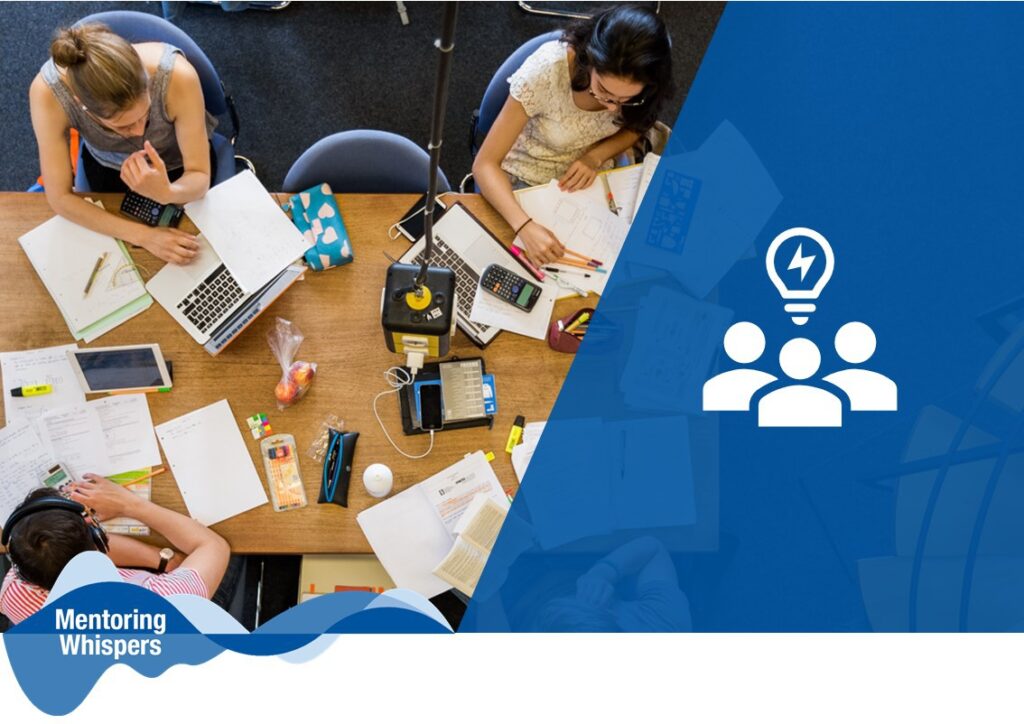 Study groups are all well and good, but how do you learn in a group without it just becoming a nice chat and a coffee break? Currently, thanks to Corona, the danger of this is probably not so high, but even digitally you can get lost in conversations.
Study groups are all well and good, but how do you learn in a group without it just becoming a nice chat and a coffee break? Currently, thanks to Corona, the danger of this is probably not so high, but even digitally you can get lost in conversations.
Group size:
It is advisable not to let the group grow too large. A group with discussion character should be limited to two to four people so that everyone has enough speaking time. A group that is mainly calculating with each other can also be somewhat larger since the discussion is less important here. But even then, there should not be too many people, otherwise, you will lose the overview and it will be much more difficult to find suitable rooms for learning.
Group composition:
When it comes to the composition of the study group, a similar communication style, and similar character traits are often helpful, as there is less potential for conflict. However, it can be very helpful if the thinking structure, problem-solving strategies, and prior knowledge are different, as this creates synergy effects.
Clarify expectations:
New best friends or means to an end: Clarify with your group partners whether you are meeting purposefully just to learn or whether you are actually friends who are also learning together. If you’re studying with friends, you’ll quickly get lost in conversation or distracted. Arrange fixed “friend” times with chatting and coffee and fixed “study” times where you concentrate on preparing for the exams.
Goals and deadlines:
Set goals and deadlines at the beginning, until when which topics have to be worked on and when which exercises and exams should be calculated. This way, everyone knows by when which material has to be worked on and read independently and when which topics or tasks are due. At the latest three days before the exam, the old exams should also be calculated, preferably under realistic conditions. This will give you an impression of whether you understand the problems and can solve them quickly enough.
Working in the group:
Depending on whether you are studying for an oral exam or for a written exam with math problems, the preparation will be different. For an oral exam, it is advisable to have prepared well before the study group meeting and then discuss open questions in the group and explain the topics to each other. This is especially helpful because the exam will also require oral recitation of what has been learned. When preparing for a written exam, the most important thing is calculating. Here you can use different strategies. Either everyone calculates alone and meets to discuss questions and calculation methods. Or you actuelly solve problems together. This is often helpful, especially at the beginning, because then questions can be clarified quickly or difficult tasks can be discussed directly together and you save the time in which you sit clueless in front of the exercise and do not know how to start. In social distancing, you can also spend silent learning times together by simply running the video conference and discussing at arranged times.
Premises:
Currently, meeting digitally is probably easiest, but if you are a two-person study group, why not meet for a walk and discuss the most important topics and questions while wandering around? This will also help you get out for once and get your body moving again. If it is not Corona time, there are several options for the study group meeting. RWTH offers many study rooms, some of which are also suitable for study groups. Check out the various study room listings to see if there is one near you. There are also cafés that offer learning opportunities or you can simply go to the nearest park.
Study rooms of the RWTH Aachen University
Study Rooms on the RWTH Website
Study Rooms University Library
Study Rooms Asta
Written by: Iris Heisterklaus


